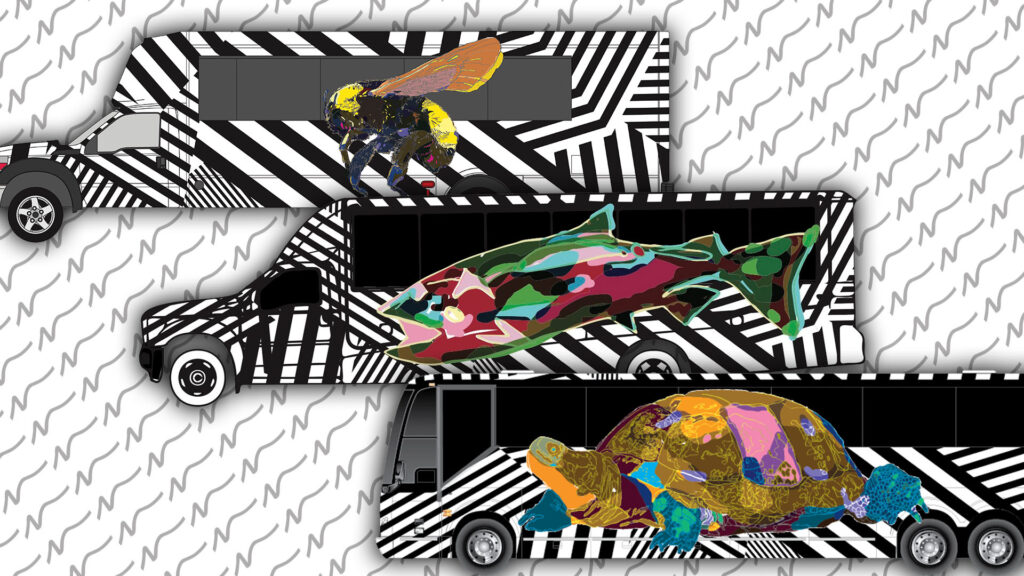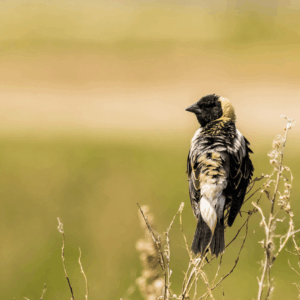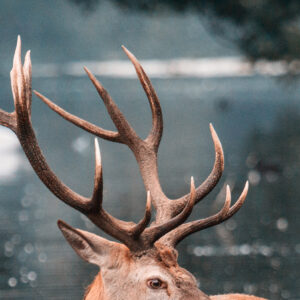Meet the Iconic NatureBus Endangered Species
The U.N. NatureCOP meeting in Montreal is a chance to stop biodiversity collapse. To tell world leaders how important this opportunity is to Canadians, Nature Canada’s NatureBus Tour is crossing the country to collect messages of hope from nature-lovers to share with the world in Montreal
Put your Letter on the NatureBus!
We partnered with artist Patrick Thompson, who has exhibited internationally working in painting, sculpture, printmaking and public installations, as well as local partners in communities from each bus launch region, to design the three buses journeying to NatureCOP. The patterns behind the species are representative of an 18th century camouflage style titled Razzle Dazzle meant to distort ships on the water. Working with local children, designs of regionally specific endangered species have been wrapped onto the bus.

Let’s meet these fascinating species!
Chinook Salmon
These hefty fish, also known as ‘King’ Salmon, are the biggest Pacific Salmon species. Some Chinook Salmon have been recorded as measuring over 1.5 meters!
Chinook Salmon are up against a tidal wave of complex and interconnected issues such as climate change, overfishing, and habitat destruction. Human-made dams are also preventing Chinook Salmon from getting to their spawning grounds.
Loggerhead Shrike
With their thick, hooked bills and moniker, “the only truly predatory songbirds” you’d think these tough-as-nails carnivores would have nothing to fear. Famous for impaling prey—from grasshoppers to mice—on thorns or barbed wire, what could possibly put them in danger?
The most significant threat to the Loggerhead Shrike is land development and the resulting habitat loss. Pesticides also endanger Loggerhead Shrikes, killing off important prey and bioaccumulating in the prey that survives. Car strikes can also be fatal, since Loggerhead Shrikes often hunt along roads.
Blanding’s Turtle
Blanding’s Turtles may look like they’re always smiling due to their curved mouths, but it’s a hard knock life for these solitary reptiles.
Though they have long natural lifespans of up to 80 years, Blanding’s Turtles are in trouble, threatened by habitat loss and road mortality. As the wetlands they call home are destroyed, they need to traverse further and further distances to find places to live, nest, and feed. Too often, their journeys take them across roads where they are run over.
Woodland Caribou
Living in Canada’s Boreal forests, Woodland Caribou require vast, uninterrupted, and undisturbed areas of suitable habitat to survive. Unlike their Arctic tundra counterparts in the far north, Woodland Caribou stay in the forest all year as opposed to migrating long distances between seasons.
With so much of the Boreal forest under increasing pressure from logging, mining, and oil and gas operations and 90 percent unprotected, it’s no wonder Woodland Caribou are at risk from habitat destruction and human disturbances such as road and pipeline construction.
Bohemian Cuckoo Bumble Bees
These medium-sized bumble bees are somewhat opportunistic little buggers, who take over the already established colonies of other bumble bees rather than creating their own. Nevertheless, they play a crucial role in ecosystems as natural pollinators.
Bohemian Cuckoo Bumble Bees are endangered due to the decline of host species such as the Yellow-banded Bumble Bee, pesticides, habitat loss, and climate change.
Why endangered species need NatureCOP
We are currently living in the biggest mass extinction since the dinosaurs.
In the midst of this biodiversity crisis, Canada’s government has promised to halt and reverse nature loss by 2030. So far, however, they do not have a plan for doing so.
NatureCOP provides a unique opportunity for Canada’s representatives to push for a plan. The post-2020 Global Biodiversity Framework, a new global agreement to halt and reverse biodiversity loss over the next decade, is expected to be signed at NatureCOP. It could mean real action for protecting biodiversity.
Telling PM Trudeau and his ministers that you expect results from NatureCOP. Send your Letter to Montreal on the NatureBus Today!



